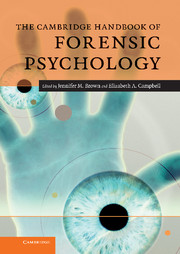Book contents
- The Cambridge Handbook of Forensic Psychology
- The Cambridge Handbook of Forensic Psychology
- Copyright page
- Dedication
- Contents
- Figures
- Tables
- Contributors
- Acknowledgements
- Forensic psychology:
- Part I Psychological underpinnings
- Part II Assessments
- 2.1 Child victims of sexual abuse
- 2.2 Credibility
- 2.3 Crime pattern analysis
- 2.4 Evaluating violence risk in young people
- 2.5 Eyewitness testimony
- 2.6 False memory
- 2.7 Intellectual disabilities and offending
- 2.8 Interrogative suggestibility and false confessions
- 2.9 Investigative interviewing
- 2.10 Mental health
- 2.11 Mentally disordered offenders
- 2.12 Memory
- 2.13 Offender profiling
- 2.14 Parenting capacity and conduct
- 2.15 Parole decision making
- 2.16 Personality and crime
- 2.17 Personality disorder classification in forensic settings
- 2.18 Polygraphy
- 2.19 Post-traumatic stress disorder
- 2.20 Psychopathy
- 2.21 Risk and dangerousness in adults
- 2.22 Sexual offender assessment
- 2.23 Statement validity analysis
- 2.24 Suicide risk in adolescents and adults
- 2.25 Vulnerable adults’ capacity
- Part III Interventions
- Part IV Psychology and criminal behaviour
- Part V Psychology and civil law
- Part VI Special topics
- Part VII Professional practice
- Part VIII Research practice
- Author index
- Subject index
2.4 - Evaluating violence risk in young people
from Part II - Assessments
Published online by Cambridge University Press: 06 July 2010
- The Cambridge Handbook of Forensic Psychology
- The Cambridge Handbook of Forensic Psychology
- Copyright page
- Dedication
- Contents
- Figures
- Tables
- Contributors
- Acknowledgements
- Forensic psychology:
- Part I Psychological underpinnings
- Part II Assessments
- 2.1 Child victims of sexual abuse
- 2.2 Credibility
- 2.3 Crime pattern analysis
- 2.4 Evaluating violence risk in young people
- 2.5 Eyewitness testimony
- 2.6 False memory
- 2.7 Intellectual disabilities and offending
- 2.8 Interrogative suggestibility and false confessions
- 2.9 Investigative interviewing
- 2.10 Mental health
- 2.11 Mentally disordered offenders
- 2.12 Memory
- 2.13 Offender profiling
- 2.14 Parenting capacity and conduct
- 2.15 Parole decision making
- 2.16 Personality and crime
- 2.17 Personality disorder classification in forensic settings
- 2.18 Polygraphy
- 2.19 Post-traumatic stress disorder
- 2.20 Psychopathy
- 2.21 Risk and dangerousness in adults
- 2.22 Sexual offender assessment
- 2.23 Statement validity analysis
- 2.24 Suicide risk in adolescents and adults
- 2.25 Vulnerable adults’ capacity
- Part III Interventions
- Part IV Psychology and criminal behaviour
- Part V Psychology and civil law
- Part VI Special topics
- Part VII Professional practice
- Part VIII Research practice
- Author index
- Subject index
Summary
- Type
- Chapter
- Information
- The Cambridge Handbook of Forensic Psychology , pp. 166 - 176Publisher: Cambridge University PressPrint publication year: 2010
- 3
- Cited by

